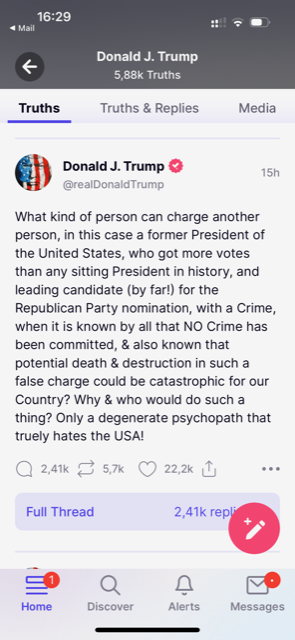Is the digital town square becoming a battleground for political retribution? President Trump's actions on his social media platform, Truth Social, raise serious questions about the intersection of free speech, financial interests, and the future of public discourse.
The former President's recent pronouncements on Truth Social have sparked a flurry of controversy, drawing attention to the complex relationship between online platforms, political influence, and the exercise of power. His messages, often delivered with the characteristic directness that has defined his political career, have ranged from inflammatory accusations against educational institutions to market-moving pronouncements regarding investments and policy. The implications of these statements are vast, reaching into the realms of education, finance, and international relations. The very nature of Truth Social, a platform he created after being banned from other major social media sites, adds another layer to this already intricate tapestry. It is a space where he not only communicates with his supporters but also, ostensibly, wields direct influence over his business ventures and potentially, the markets.
To better understand the individuals and entities at the heart of this evolving narrative, here is a summary of the key players and their relationships:
| Category | Details |
|---|---|
| Name | Donald J. Trump |
| Born | June 14, 1946 (Age 77) |
| Known For | Businessman, Television Personality, Politician, 45th President of the United States |
| Political Affiliation | Republican Party |
| Key Roles |
|
| Notable Actions & Statements |
|
| Relationship to Truth Social | Founder and primary user, and a significant shareholder in the parent company. |
| Net Worth | Estimated to be between $2.3 and $6 billion, with a significant portion tied to his stake in Trump Media & Technology Group. |
| Controversies |
|
| Link to Authentic Website | Official Website |
One of the most immediate concerns arising from Trump's activity on Truth Social revolves around the issue of free speech, particularly within the context of higher education. In a statement that has sent ripples through academic circles, the former President threatened funding cuts for colleges and universities should they fail to curtail what he deemed as illegal protests. This message, disseminated via Truth Social, ignited a fierce debate about the boundaries of protected speech on college campuses, the role of government in policing such speech, and the chilling effect such threats might have on academic freedom. The implied consequence of withholding funding for protected speech has been viewed by many as a dangerous precedent, potentially stifling dissent and critical inquiry.
The timing of Trump’s statements is also significant. His pronouncements often coincide with – and sometimes appear to be directly influencing – real-world events. A prime example of this is his statement hours before announcing a 90-day pause on almost all tariffs. The implications of such pronouncements are profound. His pronouncements aren’t just words; they are potential market movers, capable of affecting stock prices, economic policies, and the global economy. The very existence of Truth Social, and its function as a platform for Trump’s unfiltered communication, gives him, intentionally or unintentionally, a direct means of influencing the financial landscape.
The platform itself also invites scrutiny. Launched in early 2022, after Trump's ban from major social media sites such as Facebook and Twitter (now X), Truth Social became his digital soapbox. As a public company, the financial implications of his activity on the platform are even more complex. With a significant ownership stake in Trump Media & Technology Group, the parent company of Truth Social, any pronouncements he makes could directly impact his own financial interests. This raises a fundamental question: how do you separate the actions of a politician from the financial interests of a businessman when both are so intertwined?
Trump's use of Truth Social extends beyond political and financial pronouncements. It is a place where he airs grievances, attacks his perceived enemies, and promotes his agenda. Harvard University, for instance, found itself the target of a public rebuke on the platform, with Trump calling it an Anti-Semitic, Far Left Institution. This type of rhetoric, while not new for Trump, is amplified by his direct control over the platform and its potential impact on public perception.
The former President has also, on occasion, used Truth Social to comment on international affairs. One striking example is his critical assessment of the Russian strikes on Kyiv. His statement, I am not happy with the Russian strikes on KYIV. Not necessary, and very bad timing. Vladimir, STOP! 5000 soldiers a week are dying, offered a rare glimpse into his current views on the conflict. These statements, while delivered in his signature style, highlight the ways in which Truth Social serves as a conduit for both domestic and international commentary. The platform, in this context, becomes a place where foreign policy is crafted and communicated, potentially with significant repercussions.
The ongoing evolution of Truth Social, and the role it plays in the political and financial landscape, highlights the need for a clear understanding of the implications of social media platforms in modern society. The actions of high-profile figures, and the ways in which they utilize these platforms to communicate with, and potentially influence, the world, are deserving of close scrutiny. The intersection of political ambition, financial interests, and the power of online communication is a complex and evolving situation. It is one that demands careful consideration and thoughtful discourse.



